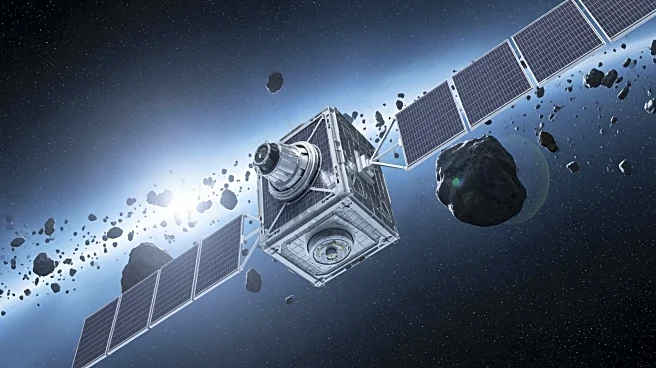What's Happening?
Skynet-1A, a military satellite launched in 1969, has been mysteriously moved from its original geostationary orbit over Africa to a new position over the Americas. Originally built by Philco-Ford and
launched aboard a US Air Force Delta rocket, Skynet-1A was Britain's first military communications satellite. It fell silent due to hardware failure less than two years after its launch, becoming space debris. Recently, satellite trackers noticed its unexpected relocation, which suggests it may have been moved intentionally, possibly using onboard thrusters previously thought defunct. This shift raises questions about who might have moved the satellite and why, as such a change could not have occurred naturally.
Why It's Important?
The relocation of Skynet-1A highlights the growing issue of space debris and the potential risks it poses to active satellites. With over 1,000 satellites occupying geostationary orbit, the presence of Skynet-1A in a 'gravity well' could lead to collisions, creating thousands of high-speed fragments that threaten other satellites. The UK remains responsible for any damage caused by Skynet-1A under the United Nations Outer Space Treaty. This situation underscores the need for effective space debris management and removal strategies to prevent potential collisions and ensure the safety of operational satellites.
What's Next?
Efforts to address space debris are underway, with the UK Space Agency collaborating with companies like ClearSpace and Astroscale to develop debris removal technologies. These initiatives include testing robotic arms, nets, and drag sails designed to de-orbit defunct satellites. However, most of these technologies are still in early stages, and few are aimed at high-orbit targets like Skynet-1A. The UK has committed to responsible space stewardship by signing the Long-Term Sustainability Guidelines issued by the United Nations, but the Skynet-1A case serves as a reminder of the challenges posed by aging space hardware.
Beyond the Headlines
The mysterious movement of Skynet-1A raises ethical and legal questions about satellite ownership and control. The lack of definitive records documenting the satellite's operations and transfer of control between the UK and the US complicates efforts to determine responsibility for its current state. This situation highlights the importance of maintaining accurate records and transparency in space operations to prevent similar issues in the future. As space becomes increasingly congested, international cooperation and clear regulations will be crucial in managing space debris and ensuring the long-term sustainability of space activities.










